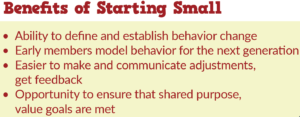If you are starting a community today – you are both blessed and cursed by history.
Years of research and community development today offer more advice tha n ever on the best practices of community. But the growth of online communities generally can also set expectations that new communities should scale quickly and provide near-immediate ROI.
n ever on the best practices of community. But the growth of online communities generally can also set expectations that new communities should scale quickly and provide near-immediate ROI.
It’s a nice theory, but as our research and experience has found time and again, it’s flawed. The Community Roundtable recommends taking the long view; to generate sustainable ROI start small—then grow.
Trying to scale too quickly is perhaps the biggest, most expensive mistake a community manager can make. Even if you are working to build a community of thousands or more, we recommend you start of with a group of members that you can reasonably expect to get to know individually.
The reason is simple. You want to start as you mean to continue.
If you have defined the behaviors you wish to see and considered what the ideal engagement mix would be – the percentage of lurkers, contributors, creators and collaborators you would ideally like (our research shows the average mix to be 64%, 17%, 11% and 8% respectively)—you should work with a limited set of early members to establish that culture before inviting in more members.
By spending time with a small group to establish the community culture you want to foster—and learning more about what they want from the community—you create members who will model and set expectations for every new member going forward. New members will quickly acclimate and conform to the social and behavioral norms that have been established.
Scaling and then working to change behavior puts you against the tide of norms established without you. The community defines its own standards, which may or may not align with the behaviors and shared value you hope to achieve. Changing the behavior of thousands is a very challenging task and while it can be done, it’s not efficient to take that approach if you don’t have to.
Starting small also provides you a valuable learning opportunity—to see the community through the eyes of members. Taking the time to engage with members individually and get more personal feedback often illuminates thorny issues that could prove especially troublesome at scale. For example, user interface issues, platform issues, and other structural problems can be more easily discovered and addressed in small communities—and you have a much greater ability to constructively engage your members in the troubleshooting process.
Are you charged with building a community? Check out the Community Manager Handbook for more community best practices, strategy ideas and case studies.
—
Want the chance to contribute to research like the Community Manager Handbook? Members of TheCR Network get exclusive professional development opportunities like this and more! Join us and let us help you grow your career as a community manager.
